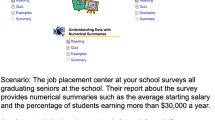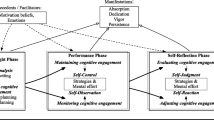Abstract
Self-regulated learning (SRL), or the ability for a learner to monitor and change their cognitive, affective, metacognitive, and motivational processes, is a critical skill to enact, especially while learning about difficult topics within an intelligent tutoring system (ITS). Learners’ enactment of SRL behaviors during learning with ITSs has been extensively studied within the human-computer interaction field but few studies have examined the extent to which learners’ SRL behaviors quantitatively demonstrate a functional system (i.e., equilibrium of repetitive and novel behaviors). However, current analytical approaches do not evaluate how the functionality of learners’ SRL behaviors unfolds as time on task progresses. This paper reviews two analytical approaches, both based within categorical auto-recurrence quantification analysis (aRQA), for examining how learners’ SRL complex behaviors emerge during learning with an ITS. The first approach, binned categorical aRQA, segments learners’ SRL behaviors into bins and performs categorical aRQA on the SRL behaviors enacted within those bins to produce metrics of complexity that demonstrate how learners’ functionality of their SRL systems change over time. The second approach, cumulative categorical aRQA, continuously calculates complexity metrics as learners enact SRL behaviors to identify the evolution of learners’ functional SRL. These two approaches allow researchers to identify how the functionality of SRL behaviors change over time in relationship to the occurrences within the ITS environment. From this discussion, we provide actionable implications for contributing to how learners’ SRL functionality can be visualized and scaffolded during learning with an ITS.
Access this chapter
Tax calculation will be finalised at checkout
Purchases are for personal use only
Similar content being viewed by others
References
Azevedo, R., et al.: Lessons learned and future directions of MetaTutor: leveraging multichannel data to scaffold self-regulated learning with an intelligent tutoring system. Front. Psychol. 13, 813632 (2022)
Azevedo, R., Gašević, D.: Analyzing multimodal multichannel data about self-regulated learning with advanced learning technologies: issues and challenges. Comput. Hum. Behav. 96, 207–210 (2019)
Azevedo, R., Wiedbusch, M.: Theories of metacognition and pedagogy applied in AIED systems. In: du Boulay (ed.) Handbook of Artificial Intelligence in Education, pp. 45–67. Springer, Dordrecht (2023)
Winne, P., Azevedo, R.: Metacognition and self-regulated learning. In: Sawyer, K. (ed.) The Cambridge Handbook of the Learning Sciences, 3rd edn, pp. 93–113. Cambridge University Press (2022)
Winne, P.H.: Cognition and metacognition within self-regulated learning. In: Schunk, D.H., Greene, J.A. (eds.) Educational Psychology Handbook Series. Handbook of Self-regulation of Learning and Performance, pp. 36–48. Routledge/Taylor & Francis Group (2018)
Azevedo, R., Dever, D.A.: Metacognition in multimedia learning. In: Mayer, R.E., Fiorella, L. (eds.) Cambridge Handbook of Multimedia Learning, 3rd edn., pp. 132–142. Cambridge University Press, Cambridge (2022)
Dever, D.A., Sonnenfeld, N.A., Wiedbusch, M.D., Schmorrow, S.G., Amon, M.J., Azevedo, R.: A complex systems approach to analyzing pedagogical agents’ scaffolding of self-regulated learning within an intelligent tutoring system. Metacognition Learn. 1–33 (2023)
Dever, D.A., Wiedbusch, M.D., Romero, S.M., Azevedo, R.: Investigating pedagogical agents’ scaffolding of self‐regulated learning in relation to learners’ subgoals. Br. J. Educ. Technol. (2024)
Taub, M., Azevedo, R.: How does prior knowledge influence eye fixations and sequences of cognitive and metacognitive SRL processes during learning with an Intelligent Tutoring System? Int. J. Artif. Intell. Educ. 29(1), 1–28 (2019)
Munshi, A., Biswas, G.: Personalization in OELEs: developing a data-driven framework to model and scaffold SRL processes. In: Isotani, S., Millán, E., Ogan, A., Hastings, P., McLaren, B., Luckin, R. (eds.) Artificial Intelligence in Education. Lecture Notes in Computer Science, vol. 11626, pp. 354–358. Springer, Cham (2019). https://doi.org/10.1007/978-3-030-23207-8_65
Schunk, D.H., Greene, J.A.: Handbook of Self-regulation of Learning and Performance, 2nd edn. Routledge/Taylor & Francis Group, New York (2018)
Dever, D.A., Sonnenfeld, N.A., Wiedbusch, M.D., Azevedo, R.: Pedagogical agent support and its relationship to learners’ self-regulated learning strategy use with an intelligent tutoring system. In: Rodrigo, M., Noburu, M., Cristea, A., Dimitrova, V. (eds.) International Conference on Artificial Intelligence in Education, pp. 332–343. Springer, Cham (2022). https://doi.org/10.1007/978-3-031-11644-5_27
Wiedbusch, M., Dever, D., Wortha, F., Cloude, E., Azevedo, R.: Revealing data feature differences between system- and learner-initiated self-regulated learning processes within hypermedia. In: Sottilare, R.A., Schwarz, J. (eds.) Human Computer Interaction International, pp. 481–495. Springer, Cham. (2021). https://doi.org/10.1007/978-3-030-77857-6_34
Mayer, R.E.: Computer games in education. Annu. Rev. Psychol. 70, 531–549 (2019)
Nelson, T.O.: Metamemory: a theoretical framework and new findings. Psychol. Learn. Motiv. 26, 125–173 (1990)
Pintrich, P.R.: The role of goal orientation in self-regulated learning. In: Boekaerts, M., Pintrich, P.R., Zeidner, M. (eds.) Handbook of Self-regulation, pp. 451–502. Academic Press (2000)
Zimmerman, B.J., Moylan, A.R.: Self-regulation: where metacognition and motivation intersect. In: Hacker, D.J., Dunlosky, J., Graesser, A.C. (eds.) Handbook of Metacognition in Education, pp. 299–315. Routledge (2009)
Chatterjee, A., Iannacchione, G.: The many faces of far-from-equilibrium thermodynamics: deterministic chaos, randomness, or emergent order? MRS Bull. 44(2), 130–133 (2019)
Sujith, R.I., Unni, V.R.: Dynamical systems and complex systems theory to study unsteady combustion. Proc. Combust. Inst. 38(3), 3445–3462 (2021)
Battiston, F., et al.: The physics of higher-order interactions in complex systems. Nat. Phys. 17(10), 1093–1098 (2021)
Fisher, D.N., Pruitt, J.N.: Insights from the study of complex systems for the ecology and evolution of animal populations. Curr. Zool. 66(1), 1–14 (2020)
Favela, L.H., Amon, M.J.: Reframing cognitive science as a complexity science. Cogn. Sci. 47(4), e13280 (2023)
Mitchell, M.: Complexity: A Guided Tour. Oxford University Press, New York (2009)
Van Orden, G.C., Holden, J.G., Turvey, M.T.: Human cognition and 1/f scaling. J. Exp. Psychol. Gen. 134(1), 117–123 (2005)
Wiener, N.: Cybernetics. Sci. Am. 179, 14–19 (1948)
Kelso, J.A.S.: Dynamic Patterns: The Self-organization of Brain and Behavior. MIT Press, Cambridge (1995)
Strogatz, S.H.: Nonlinear Dynamics and Chaos: With Applications to Physics, Biology, Chemistry, and Engineering, 2nd edn. CRC Press, New York (2015)
Francescotti, R.M.: Emergence. Erkenntnis 67, 47–63 (2007)
Favela, L.H.: Cognitive science as complexity science. Wiley Interdisc. Rev. Cogni. Sci. 11, e1525 (2020)
Dever, D.A., Amon, M.J., Vrzakova, H., Wiedbusch, M.D., Cloude, E.B., Azevedo, R.: Capturing sequences of learners’ self-regulatory interactions with instructional material during game-based learning using auto-recurrence quantification analysis. Front. Psychol. 13, 813677 (2022)
Li, S., Zheng, J., Huang, X., Xie, C.: Self-regulated learning as a complex dynamical system: examining students’ STEM learning in a simulation environment. Learn. Individ. Differ. 95, 102144 (2022)
Fan, Y., et al.: Improving the measurement of self-regulated learning using multi-channel data. Metacogn. Learn. 17, 1025–1055 (2022)
Prigogine, I., Stengers, I.: Order Out of Chaos: Man’s New Dialogue with Nature. Flamingo, London (1985)
Larsson, J., Dahlin, B.: Educating far from equilibrium: chaos philosophy and the quest for complexity in education. Complicity Int. J. Complex. Educ. 9, 1–14 (2012)
Hilpert, J.C., Marchand, G.C.: Complex systems research in educational psychology: aligning theory and method. Educ. Psychol. 53(3), 185–202 (2018)
Marchand, G.C., Hilpert, J.C.: Complex systems approaches to educational research: introduction to the special issue. J. Exp. Educ. 88(3), 351–357 (2020)
Marchand, G.C., Hilpert, J.C.: Contributions of complex systems approaches, perspectives, models, and methods in educational psychology. In: Schutz, P.A., Muis, K.R. (eds.) Handbook of Educational Psychology, 4th edn., pp. 139–161. Routledge, New York (2023)
Hilpert, J.C., Greene, J.A., Bernacki, M.: Leveraging complexity frameworks to refine theories of engagement: advancing self-regulated learning in the age of artificial intelligence. Br. J. Edu. Technol. 54, 1204–1221 (2023)
Koopmans, M.: Education is a complex dynamical system: challenges for research. J. Exp. Educ. 88(3), 358–374 (2020)
Gorman, J.C., Amazeen, P.G., Cooke, N.J.: Team coordination dynamics. Nonlinear Dyn. Psychol. Life Sci. 14(3), 265–289 (2010)
Poquet, O., Jovanovic, J., Pardo, A.: Student profiles of change in a university course: a complex dynamical systems perspective. In: Hilliger, I., Khosravi, H., Rienties, B., Dawson, S. (eds.) LAK23: 13th International Learning Analytics and Knowledge Conference, pp. 197–207. ACM (2023)
Webber, C.L., Zbilut, J.P.: Recurrence quantification analysis of nonlinear dynamical systems. Tutorials Contemp. Nonlinear Methods Behav. Sci. 94, 26–94 (2005)
Bhardwaj, R., Das, S.: Recurrence quantification analysis of a three level trophic chain model. Heliyon 5 (2019)
Meinecke, A.L., Handke, L., Mueller-Frommeyer, L.C., Kauffeld, S.: Capturing non-linear temporally embedded processes in organizations using recurrence quantification analysis. Eur. J. Work Organ. Psy. 29(4), 483–500 (2020)
Wallot, S.: Recurrence quantification analysis of processes and products of discourse: a Tutorial in R. Discourse Process. 54(5–6), 382–405 (2017)
Amon, M.J., Vrzakova, H., D’Mello, S.K.: Beyond dyadic coordination: multimodal behavioral irregularity in triads predicts facets of collaborative problem solving. Cogn. Sci. 43(10), e12787 (2019)
Zimmerman, B.J., Schunk, D.H.: Self-regulated learning and performance: an introduction and an overview. In: Zimmerman, B.J., Schunk, D.H. (eds.) Handbook of Self-regulation of Learning and Performance, pp. 15–26. Routledge/Taylor & Francis Group (2011)
Klahr, D., Dunbar, K.: Dual space search during scientific reasoning. Cogn. Sci. 12, 1–48 (1988)
D’Mello, S.K., Graesser, A.: Intelligent tutoring systems: how computers achieve learning gains that rival human tutors. In: Schutz, P.A., Muis, K.R. (eds.) Handbook of Educational Psychology, 4th edn, pp. 603–629. Routledge (2023)
Greene, J.A., Azevedo, R.: A macro-level analysis of SRL processes and their relations to the acquisition of a sophisticated mental model of a complex system. Contemp. Educ. Psychol. 34(1), 18–29 (2009)
du Boulay, B.: Pedagogy, cognition, human rights, and social justice. Int. J. Artif. Intel. Educ. 1–6 (2023)
Acknowledgments
The research reported in this manuscript was supported by funding from the National Science Foundation (DRL#1916417, DRL#1661202 and DUE#1761178). The authors would also like to thank the members of the SMART Lab at the University of Central Florida.
Author information
Authors and Affiliations
Corresponding author
Editor information
Editors and Affiliations
Ethics declarations
The authors have no competing interests to declare that are relevant to the content of this article.
Rights and permissions
Copyright information
© 2024 The Author(s), under exclusive license to Springer Nature Switzerland AG
About this paper
Cite this paper
Dever, D.A., Wiedbusch, M.D., Azevedo, R. (2024). Analytical Approaches for Examining Learners’ Emerging Self-regulated Learning Complex Behaviors with an Intelligent Tutoring System. In: Sottilare, R.A., Schwarz, J. (eds) Adaptive Instructional Systems. HCII 2024. Lecture Notes in Computer Science, vol 14727. Springer, Cham. https://doi.org/10.1007/978-3-031-60609-0_9
Download citation
DOI: https://doi.org/10.1007/978-3-031-60609-0_9
Published:
Publisher Name: Springer, Cham
Print ISBN: 978-3-031-60608-3
Online ISBN: 978-3-031-60609-0
eBook Packages: Computer ScienceComputer Science (R0)




